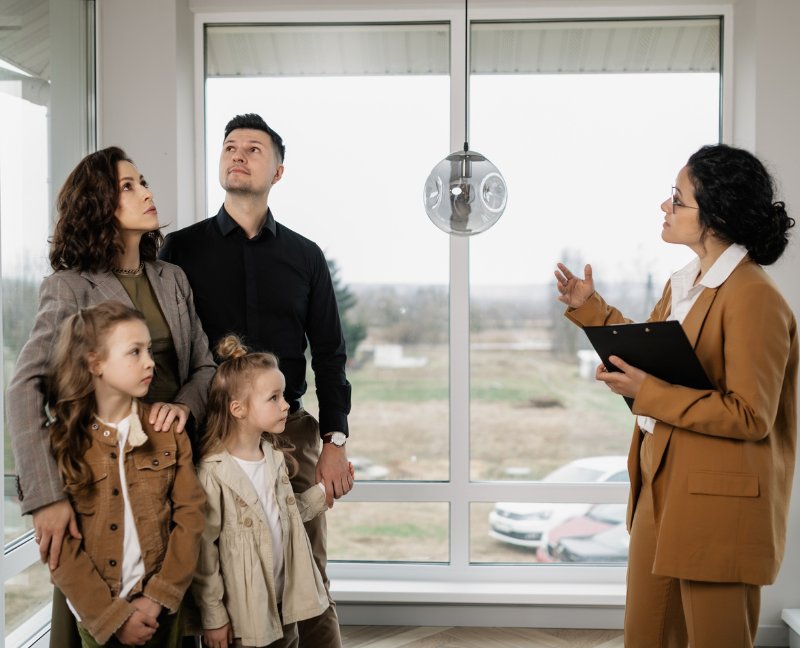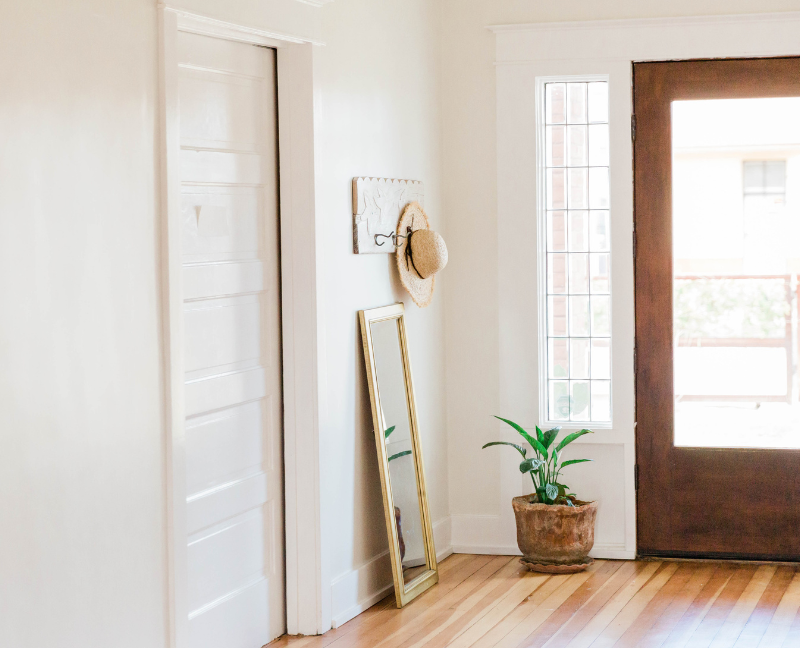In exploring "Questions About Buying A Home," the initial considerations include establishing a housing budget within 25% of monthly income, optimizing a 5–10% down payment, and understanding the nuances of closing costs.
These financial insights, strategic planning for moving costs, and mindful choices in furnishing and decorating lay a solid foundation for informed and responsible home buying.
So, in this part, let us continue discussing the questions to ask about buying a home.
If you've never lived in a hurricane-prone area, you've probably never had to defend yourself. Ask if your new home is prone to tornadoes, floods, wildfires, earthquakes, or ice storms. Then, make sure your house insurance covers local natural disasters. You may require extra coverage if not.
It’s hard to answer this problem independently; you need a house inspection before buying. Your seller must report known issues, although they may leave something out.
A good home inspection will explain the safety and performance of the roof, foundation, HVAC, and plumbing systems safety and performance. If there are red flags, you can pass or negotiate a cheaper price and solve the issues yourself.
Asphalt roofs last 20 years, according to most experts. So, ask this critical roof inquiry before buying a house: How old has the roof been there?
Replacement of an aging roof might cost over $12,000. A sudden replacement might ruin your budget.
Imagine getting into your new home and discovering all the appliances are broken. You can avoid such a surprise if you know certain essential appliances are dying before buying the house. The vendor may also offer a good deal.
Ask about the lifespan of all house items and when the old or worn-out items will be replaced. This includes the HVAC, water heater, washer, dryer, fridge, stove, and dishwasher.
Since different states have varying regulations regarding what must be included in a property purchase, you must find out what is included with the house you purchase. Don't automatically assume you're buying every light fixture, appliance, and window covering when submitting an offer. If so, you can become unhappy when the refrigerator is gone, and there's a large empty area in the kitchen.

You should know what nearby similar houses are in the market. This will help you know if the home you seek is reasonably priced. You can get the answer from your real estate agent since they will be intimately familiar with the types of homes currently for sale in the neighborhood where you are looking to buy. And just so you know the technical terms, this is a competitive market analysis (CMA).
Find out why the seller is selling their home. Knowing their motivation in selling their property might help you negotiate.
For instance, sellers leaving because of a new job may be more likely to negotiate a price to sell it faster. Probing them can also help you learn more about the quality of the house.
It's a red flag if the seller can't clearly state their reason for moving or selling their home, such as looking for a bigger house or wanting to live close to their families.
Usually, when a home has been listed on sale for a longer time, it means that there might be an issue.
When a home is listed on the market for a long time, it might mean that there's an issue. Usually, it's because the asking price is too high, its location, or the home's layout.
In March 2023, U.S. residences averaged 54 days on the market. now, this number might be different depending on the location and season. Ask your real estate agent about house sales speed in your market—every market is different.
Conclusion
These are just some of the most important questions that you might ask regarding the homebuying process. There might be more as you go along the way. The key is asking as many questions as you can to your real estate agent and/or the seller before closing the deal.
Do you have more questions about selling or buying a home? If yes, feel free to drop them in the comments or call us at 317-316-8224 we can assist you!
Buying a home is all fun and games until you buy a home. It costs a fortune, has too many decisions to be made, and isn't easy to even know what to search for.
So before you start the home-buying process, it's crucial to do research and ask as many questions as you can.
Not sure what questions to ask? Don't worry! We've made it easier for you.
We've put together a list of questions to ask when buying a house to make you feel more at ease about the process.
This is the first question about buying a home since having an appropriate house budget avoids overspending on a home. Being saddled with a hefty monthly payment you can barely afford is disastrous and might lead to a huge debt. You must own your house if that happens.
Therefore, when determining your budget, it's practical to limit your mortgage payments to 25% of your monthly income. Thus, your budget will have the capacity for additional financial goals like retirement investing each month.
The 100 %-down plan is excellent for home buying as well as buying a house in cash. Aim for a 5–10% down payment on your first property if you intend to get a mortgage. A higher down payment reduces monthly payments, debt, and risk. After waiting a while and saving 20%, you'll avoid private mortgage insurance (PMI), leaving extra monthly money in your budget.
You can consider a 15-year fixed-rate mortgage if you buy a house. Stop taking 30-year loans since they increase debt and interest. Stay clear from adjustable-rate mortgages, FHA loans, and VA loans—they include hidden expenses.
Closing costs are typically 2–5% of your home's buying price. Closing costs for a $300,000 home are expected to be $6,000–15,000. Save enough for closing fees in addition to a down payment.
Local movements are less expensive than long-distance moves, varying significantly depending on the distance traveled. Verify your finances to make sure you have enough saved to cover unforeseen expenses.
If you're moving for a job, your new employer may offer a relocation package to cover your costs—64% of employees received relocation reimbursement in 2022.

This depends on the money you have for furnishing. If you purchased a fully furnished property, you're lucky; if not, you need to plan for decorating and furnishing your home.
This may be as simple as moving your furniture to your new home or buying new items.
When purchasing items, only buy new or old furniture you can afford to pay cash for. Adding consumer debt to a mortgage is one of the most costly home buying mistakes. Decorating one area at a time can help you meet your financial goals.
Asking about location is essential. You should know various things about an area before moving in, including:
Gaining some understanding of these details can assist you in determining whether a particular area or community best suits your needs and objectives.
Having kids makes asking about the school districts near your future home important. But if you don’t have kids, a property near good schools may be worth more when you sell your home in the future.
These are just some of the questions you can ask yourself before getting a new home. We have more questions in the next part, so be sure to click this link.
The unpredictable housing market in Indiana is complicated, so buying a house here can be difficult. Navigating such a market demands expertise and careful planning, regardless of whether you're purchasing for the first time or planning to make a strategic investment.
But don't worry! In this post, we'll give you detailed information and tips on buying a house in Indiana and what you need to know about it as a first-time homebuyer.
The Hoosier State is known for being able to combine a great quality of life with a low cost of living, and these are just two reasons why buying a home in this state is a must. Here are seven simple steps on how to get started:
Financial readiness is vital when buying real estate. Here are some actions to prepare financially for buying a house in Indiana:
Make a plan for your down payment after determining your house budget. You can set your down payment; however, 20% is the norm. Homebuyers' down payments vary by mortgage type. If you put down less, your lender may require private mortgage insurance.
Indiana first-time buyers may be surprised by closing costs. Closers, like down payments, are out-of-pocket charges for home financing, purchase, and ownership. Set aside 2%–5% of the buying price for closing charges.

In Indiana, mortgage pre-approval decides how much you can borrow to buy a property. Pre-approval letters demonstrate your seriousness in financing a home with lenders.
You must understand house loans and choose the one that suits your needs before applying for pre-approval:
Traditionally, real estate agents assist homebuyers. Your agent shortlists properties from the MLS and local inventory. However, Indiana For Sale By Owner websites let you find FSBO houses.
When searching, take these in mind:
After choosing a home, make your offer appealing. It should consist of the offer price, pre-approval letter, and down payment proof of funds, including purchasing terms and contingencies.
Appraisals, property inspections, etc., are common house purchase contingencies. You might give cash or waive contingencies to attract home sellers.
Homeowners usually counteroffer. Counteroffers might be accepted or rejected. When the seller confirms your offer, they'll sign the purchase agreement and set escrow. 1% to 2% of the purchase price must be held in escrow.
Indiana house inspections reveal property issues. The property must be inspected and reported by an Indiana home inspector. There may be structural or mechanical flaws in a home inspection report. Reports allow you to demand repairs from home sellers. Consider canceling if the property is severely damaged.
Your mortgage lender requires property appraisal. A home appraisal prevents them from lending more than fair value. Get a professional Indiana house appraiser to determine its market value. The loan amount equals the appraised value. If the down payment is low, you can raise it or renegotiate.
You can close the deal if everything goes according to plan and the final walk-through is agreeable. The final stage involves paying closing costs, signing paperwork, and getting the keys.
The closing disclosure is provided by your lender three days before closing. It includes your mortgage type, monthly payment, interest rate, origination fees, closing costs, etc.
The closure will include your agent and others. Sellers, their agents, and settlement agents—real estate attorneys, escrow representatives, or title companies—are involved. The escrow will transfer the closing costs and down payment onto the seller after deducting them.
Buying a house in Indiana can be intimidating but thrilling. Here are some Indiana home-buying tips to prepare you:
Buying a home can be overwhelming; however, with the right knowledge and help from experts, you can make this journey fun and easy.
If you're looking for a new home in Indiana, our team at RE/MAX Advanced Realty - Indy Home Pros is here to help. You can check out townhouses, condos, and other properties for sale here.
Closing on a house is one of the most rewarding parts of the home-buying experience. It's the time when everything is settled, including all the fees, papers, and other necessary steps. It is officially the day you take over the property and have your keys to your new home, which marks a new beginning in your life.
The closing process is the final step of the lengthy home-buying transaction with real estate. It is when the purchase and sale agreement is signed and processed, and it usually takes at least a couple of months. It is the day when the ownership of the property is transferred to the new owner of the home, and the seller receives the proceeds from the transaction.
Closing requires the completion of many important steps. If the buyer is not paying in cash, they will need to secure a mortgage to purchase the property. There will also be a third-party inspector to inspect the home’s condition along with an appraisal of the property. Any repairs and costs will also be discussed and agreed upon, and the buyer will have a final walk-through of the property. Generally, when a final walk-through happens, all the belongings from the seller should have already been packed and moved.
On this day, all parties will be present, including the attorney to check and review the deal that will be signed upon agreement by both seller and buyer that finalizes everything. It usually lasts about 1 to 2 hours, depending on the current situation.
Interesting Reads:
Clear To Close (CTC): Everything You Need To Know About It [Part 1]
Clear To Close (CTC): Everything You Need To Know About It [Part 2]
While it usually takes 2 days or less to complete the final transaction, there might be a delay in the closing process because of several reasons, such as low appraisal rate, contingencies, title issues, and problems with the mortgage.

How Long Does It Take To Close The House?
On average, the closing of a home takes about 30 to 45 days, starting from filling out the mortgage application loan until the closing table. Securing a mortgage is often one of the main reasons that delays the closing process. How long it takes to close a house will depend on how the transaction will go between the three parties -- the loan officer, the real estate agent, and the seller. To understand more, here are the steps that you and lender will need to complete before closing on a house:
Understanding Your Documents
Study, research, and list down all the documents you need. Also, make sure to remind yourself of all the necessary deadlines.
Organize all the documents required for closing, so it will be much easier to locate the files you need when someone requests them from you.
In addition, when giving documents, check everything first and mark your list to when you submitted and who received it, so you’ll know when someone asks again.
Common Closing Documents:
Reviewing these documents is important when closing on a house. Make sure that there are no discrepancies and that all details are correct before the signing.
Here are more tips to consider when closing a home:
Consider Hiring An Attorney – Getting a legal opinion from a professional is a must before signing any closing documents. They can help you understand the things or terms you're not familiar with. They can also help ensure that the closing goes smoothly.
Getting A Home Insurance Plan – Home insurance covers damages and other insurance-related deductibles. The cost will depend on the features you will get and your home's condition. Most lenders require buyers to get the insurance and show it during the closing.
Negotiate Closing Cost – Closing costs are the fees paid to lenders and other third parties to close on your loan. It includes several fees like appraisal, title insurance, and application fees. Close costs can be expensive, but some can be negotiable.
Confirm The Closing Date – It’s the date the seller will move out of the house. The closing date usually takes a month or longer after the purchase.
Final Walk-Through – Having a final walk-through before moving the house is an opportunity for a homebuyer. It allows you to assess the property before closing as sometimes, damages occur after the first inspection.
If anything needs fixing, you can request a repair before closing the deal.
The journey of closing a home takes a lot of effort and time, especially for beginners. However, knowing and researching the entire process will help you better navigate every challenge and is much better than hurrying to sign a deal and facing problems later on. Having an idea of the documents you need and preparing can also help prevent possible delays. Some professionals can help you ensure that everything will go smoothly and avoid going on a bad deal.
If you need help closing a home or you just want to learn the buying or selling process, our team at RE/MAX Advanced Realty - Indy Home Pros is here to help.
Call us at 317-316-8224 or leave your email in the comment box below so we can assist you!
You'll eventually reach the long-awaited closing day if everything else is in line. When you attend your closing meeting, the home title is officially transferred and you become the new legal owner of the property.
Your closing day is all about wrapping up loose ends and finalizing the transaction. Signing all documentation, amending the deed, and paying your down payment and closing charges are all part of this process.
After their loan has been authorized and the Closing Disclosure has been signed, clear-to-close buyers are rarely refused. However, in some cases, a lender may deny an applicant at this point. These rejections are frequently the result of significant changes in your financial status.
Leaving your job, opening a new large credit line, or taking out another loan can all raise red flags with your home lender. If at all possible, avoid making any major improvements until the house is yours.
Once they're cleared to close, most buyers won't have to wait long to meet at the closing table. Considering this, you should have at least a 3-day buffer between obtaining the Closing Disclosure and closing.
You should also be aware that if you discover any blockages between the time you're cleared to close and the actual closure, your closing time frame may be extended. For example, if you discover substantial concerns with the home during your final walkthrough, you may need to postpone your closing meeting to provide the seller with sufficient time to make these repairs.
Is it better if I close at the end of the month?
If you arrange your closing near the end of the month, you will pay less in mortgage interest for the month in which you close. This might result in hundreds, if not thousands, of dollars in savings on closing fees. However, depending on your financial condition, it may make more sense for you to close at the beginning of the month.

What makes a mortgage commitment letter different from clear to close?
A mortgage commitment letter is an assurance from a lender that they would lend you money; nevertheless, obtaining the letter simply implies you have finished the underwriting procedure for the loan you have sought. Before your mortgage lender fully approves your loan and you are cleared to close, you or the property may still need to meet certain final criteria.
What are the underwriting standards for being clear to close?
Your lender will go over the underwriting standards you'll need to achieve to become clear to close in your mortgage commitment letter. Your lender may normally seek the following to determine whether you have met these conditions:
The Bottom Line: 'Clear to Close' Indicates You're Nearing the Finish Line
Although becoming CTC isn't the end goal for your loan, most home buyers can anticipate a closing date soon.
As with the other processes in your mortgage application, getting to your closing date as soon as possible will necessitate a thorough understanding of the clear-to-close process and what follows. Constant communication with your mortgage provider is critical to moving your application along swiftly, which is why it's critical to work with a lender you can fully trust.
While being clear to close indicates that you're nearing the end of the process, you can start your home-buying journey by becoming pre-approved. Knowing how much money you can borrow before you start shopping can allow you to shop smarter and make a more compelling offer when you find your dream property.
Owning a house is one of the largest single investments you’ll ever make, and it usually starts with house hunting.
When you buy real estate in Indiana, you’ll spend a lot of time, energy, and effort searching for the home you like. So before you close any deal, write down a list of potential questions and ask the owner before you decide to buy the property.
It’s always a good idea to do detective work and get some answers. It may not only give you peace of mind, but it will also save you from any financial problems in the future.
There are many reasons people move, such as the desire to move to a larger house, job relocation, moving to another state or country, life events, marriage, etc.
It’s good to ask this question though sometimes they won’t give you an honest answer, but it can still be helpful when you make room for negotiation.
Ask a utility to run a check and maintenance cost of the house. It’s hard to know the true cost of a house, so getting help from a knowledgeable person can save you every month.
By knowing your average water, electricity, and gas bill, you can determine if you can afford the house plus its monthly bills.
You can directly ask the seller or the real estate agent how long the house has been on the market. One of the reasons a house ends up staying on the market for long is because of its high price or because there’s something wrong with the property. The more the house spends on the market the more power you have to make room for negotiation to lower its asking price.
You can directly ask the seller or the real estate agent how long the house has been on the market.
One of the reasons a house ends up staying on the market longer than usual is either it's too expensive or the property itself. The more the house spends on the market, the more power you have to make room for negotiation to lower its asking price.
If you know the previous price of the house, you can easily notice if the price has been marked up or down. Knowing how much the seller paid can help you make room for any negotiation. If they were able to buy it at a much lower price, you can lower your offer but make sure that it is still at a reasonable price. In case they didn’t tell you the price, you can always check the public records where the house is located.
The seller will not say it outright if there is anything wrong about the neighborhood, since this might affect the buyer's decision.
You can survey the area and try to understand your potential neighborhood. Observing is one of the keys to determining whether it's the right home for you or not.
Find out if it has a strong sense of community or there are any problems before going through the purchase. Visiting the local police department can also help you determine if it is a safe environment to live in or not.
Home sellers must tell you about any current problems with the house though it may vary from state to state. However, home sellers are not legally required to disclose issues if there are any.
You can enquire whether the seller has had to repair any issues with the house and how well the remedy worked, particularly if it is a former issue that has been resolved.
It also helps to know who completed the work in case a similar issue arises.

This is one of the most common questions to ask, but it is similar to asking why they are moving. Find out how long they have lived in the house and try to have them open up or share a memory of them in the house and observe if there are any signs that the house might not serve your needs.
How the house looks is important and so is asking about the age and condition of the house as this can help you prepare for any impending expenses.
Knowing how updated it is is necessary to repair or replace important components like the water tank, A/C unit, heating system, septic systems, plumbing, electrical systems, and appliances.
It is important to ask if there are any major repairs or renovations made to the house and who did it. You may also ask if it is DIY, with a licensed contractor or professional. Bad renovation, plumbing, or construction can end up wasting more money and exhaust you financially.
You don’t always have to dig for dirt. You can ask questions with a personal touch. Try to find out what the seller loves about their home. It can get the seller to talk about their home and the neighborhood. They can also talk about a specific place in the house or a favorite spot. You might learn something positive that you might not have known.
Getting a list of questions to ask before buying a house is important. You want to make sure about its history before anything else. Talking to the seller can help you learn exactly what you could be getting into.
Besides, having a real estate agent can also give you a handful of information in case you didn’t find the answers you want to know in the seller. Knowing the house will give you peace of mind and save you the hassle.
Buying a home can seem like a daunting process. When you think about it, it may just be one of the most expensive and difficult you will ever purchase. You need to be emotionally and financially prepared. Despite that, proper preparation, research, and determination can help you get that home you’ve been wanting and waiting for — from dreams of owning to the paths toward handing over the keys to your new home.
Before dipping your toe into the buying pool, it’s important to consider whether you are now ready to take the responsibility of owning a house. The first thing is to take a closer look at your budget.
To determine how much you can spend on a home, you may start by listing down all your expenses and reviewing your bank statements. That way you can figure out how much you are spending daily, from transportation, food, and streaming services to your leisure spending and take-outs. Taking a good hard look at your finances will help you decide if now is the right time to purchase a home.
It is crucial to know if it's the right time. Just because you can get a mortgage or financial assistance doesn’t always make it the right time to do so. Keep in mind that besides the mortgage, purchasing a property involves extra one-time payments that can mount up rapidly, such as closing charges, legal fees, and other connected costs like a house inspection. Moreover, don't overlook the cost of relocation or house upgrades. Plus, you’ll want to plan for those expenses like a moving truck or new furniture. The last thing you want to do is stretch yourself too thin financially.
Wondering what's next if you’ve already made up your mind to buy a home? The first step to getting the ball rolling is to find an experienced local real estate agent to guide you through the process.
Typically, the seller will cover the commission fees for both their agent and your buyer's agent, so hiring an agent won't typically cost you anything. The agent will not only help you find your dream home (which can be very tough in a seller’s market) they’ll also help you through negotiations and paperwork. When purchasing a new home it is nice to have some experts to advocate for you when discussing pricing or needed repairs with the seller or their agent.
Understanding your local real estate market is crucial. The housing inventory in your town and how you formulate your offer can both be significantly impacted by whether it is a buyer's or seller's market. To prevent missing out on or overpaying for your desired house, rely on your real estate agent's knowledge in this area.
Now that you have an idea of the current trend and the amount of your dream house, it’s time to get a pre-approval letter. A pre-approval letter is a written estimate from a lender of how much you will likely be able to borrow from them.
The letter will help you determine how much you can afford. It will also help demonstrate a secure home loan when you are ready to make an offer on a house. During a pre-approval process, a lender will do a hard look at your credit pull, take a look at your bank accounts, and review everything including your tax returns and pay stubs. They will also confirm your employment history and dive into your assets and debts.
Pre-approval means a near-certain approval for a loan up to the amount specified by the lender, assuming nothing changes. Pre-approval letters, however, typically only hold true for 60 to 90 days due to the cyclical nature of credit scores, employment, and financial stability.
Take your time in submitting all the requirements before getting pre-approved, be sure you're serious about buying because getting pre-approved more than once quickly could harm your credit.
Now that you’ve got the nitty-gritty out of the way, it’s time for the fun part—house hunting! Choosing a neighborhood can be overwhelming but you can narrow your choices by focusing on where you can afford a home.
You can also consider the location of the house to where you are working and if you have a family, think about the schools available in the area for your child.
You can also check the shops, groceries, and restaurants nearby for your convenience. Talking to friends and family and knowing where they live will help you check out your options. Learn more about your potential location by having a quick walk or a tour of the neighborhood to help you decide.
Once you have a preferred location, the next step is to check for homes. Consider major components of the home and lay out your preferences for each — including minimum square footage, rooms like bedrooms, bathrooms, dining area, visitors area, garage spaces, finished basement, or specific neighborhood. Make sure your agent knows all the personal preferences you want. That way, you will both make the most of your time.

Once you found the one -- a.k.a. your dream home -- it’s time to make an offer.
The amount you're ready to pay, as well as information like who covers which closing expenses, whether the offer is subject to conditions (such as having to sell your own house first), and the projected closing date, will all be included in an offer. This offer is a crucial beginning point for discussions with the seller even though it might be modified along the route.
Working with your agent closely can help you make sure your offer fits your specific situation and is competitive. In a highly competitive market, where attractive listings are scarce, sellers will be likely to receive multiple offers, so you want yours to be the most attractive while still not overpaying for the property. You’ll also want to move swiftly to avoid losing out to another buyer if you’re not on the seller’s market.
Hiring a home inspector is always a good idea, so schedule a home inspection as soon as possible. They can help you learn about any issues that may prevent you from buying. A licensed home inspector knows what to look for -- they will cover the condition of the home, especially when it comes to foundations of a roof, plumbing, HVAC systems, and other defects. It will give you the chance to reconsider or have room for renegotiate if structural damage or needed repairs are discovered.
It's time to hand over the keys after the home inspection and any repairs that you and the seller have agreed upon.
This is accomplished during the closing, which operates somewhat differently depending on your state. Regardless, the transaction is completed on both sides at closure.
Before the closing date the seller, the buyer, and their representatives will sign the papers officially sealing the deal. You’ll also be given a settlement statement that lists out exactly how much you’ll be paying that day.
It will show your final purchase price and all the included fees like insurance and tax payments. These are kept in an escrow account with your mortgage lender so they may pay the bills when they are due on your behalf.
The final purchase price will be deducted from any outstanding mortgage balance and any seller-paid closing charges, such as past-due real estate taxes, agent commissions, and title company fees.
Once the closing is settled, congratulations — finally the place is yours. You’re now the proud new owner of your dream home! Enjoy and start to picture your new life inside the walls of your new home.
Disclaimer: We know this is easier said than done; however, there's no need to worry. Our team at RE/MAX Advanced Realty - Indy Home Pros is here to help!
Our agents have 8 years of average experience in selling and buying just listed homes for sale, so rest assured that we have the expertise and skills needed to help your relocation quickly and seamlessly.
Contact us at 317-298-0961 to learn more!
One of the biggest financial decisions you'll ever have to make is buying a house. It's more than just looking at what looks good for you and your family; it's about considering each stage of the process and the many factors that come along with it.
But that doesn't mean that it's always complicated. There can be a way to simplify the process and make smart and efficient decisions.
In this post, we'll help you by sharing more about the process so buying real estate in Indiana can be easier and smoother.
Establish A Budget
When you visit the ideal home, it can be depressing to learn that it is out of your price range.
Determine how much you can afford to spend to save time and disappointment. The general recommendation is to spend no more than 2.5 times your annual pay. You can use online budget estimators to find an appropriate house budget range that works for you.
Be sure to review other expenses on your bank statements, such as cable bills, gas, entertainment, food, and the like, to see where you may cut back on spending.
Get A Mortgage Pre-Approval
Being pre-approved for a mortgage rather than just being pre-qualified is the best approach to gaining an advantage in the competitive sellers' market. Pre-qualification would entail that lenders assess a homebuyer's affordability based on the data provided by the buyer.
Lenders who have determined how much they can lend after confirming the borrower's (buyer's) income, assets, and credit score are said to be "pre-approved." Pre-approval would expedite the loan acceptance and underwriting procedure even though it is not regarded as a loan commitment!
Start Your House Search
You can employ a real estate agent to assist you in your search for affordable housing. The best course of action is to make a list of your key priorities, such as the size of your home, whether it is a beginning home or a lifetime home. Looking for a rockstar real estate agent? If yes, we're here to help!
To help you further limit your options when looking for a home, keep the following in mind:

Rank the priorities from least to most important for your agent, who will show you a list of homes fitting your specific criteria.
Sleeping Costs
Owners of first-time hours might not be familiar with sleeper prices. These are costs that you failed to account for when making your budget. It's a mistake to solely think about the mortgage payment and ignore those hidden expenses, which could quickly build up!
Homeowners' insurance, property taxes, association dues, yard upkeep, utilities, repairs, and other expenses would be considered sleeper charges. If these expenses are not planned for, your disposable income will be reduced, which will make it more difficult for you to pay your mortgage.
Limit Credit Use
Before you use your credit card to make purchases or apply for store credit, stop and think. Until the loan is closed, the lending company is free to check your credit at any moment. This would imply that any strange or significant financial activity could ruin your deal's chances!
If an unexpected or unforeseen circumstance arises, discuss it with your loan officer to find out how it might have impacted the application.
Have Your House Inspected
Home inspections are still a requirement when buying a property, even though lenders won't demand them to obtain a loan. An expert will examine the home during a home inspection to search for any current or potential problems.
They will perform several checks, including testing the electrical systems and the roofing as well as making sure the appliances function as promised. You'll be given a list of the issues found after you're done.
Look carefully over the list for any significant problems or substantial health risks. Before concluding a sale, get in touch with the seller and ask them to fix the problem, such as replacing broken shutters. Move on to another house if things don't work out.
Without a home inspection, you can be forced to make expensive repairs that you'll be responsible for paying for after the sale.
Obtain A Home Valuation
Home appraisals are reviews that inform you of the current value of the home. Before making a mortgage-financed home purchase, you will require an appraisal.
Given that they are unable to lend more money than a home is worth, lenders will demand this. If the evaluated value is ever less than the offer, acquiring finance could be difficult.
Additionally, buyers must include an appraisal contingency in their offers so that, if the appraisal comes in below the asking price of the property, they can withdraw their offer or renegotiate the price without losing their earnest money deposit.
Request Repairs
You must ask the seller to address any faults found after reviewing the results of the home inspection. This can be done by:
List the problems and the requests you have, and your agent will send this information to the seller's agent. Alternatively, you might bargain with the vendor directly.
Conclusion
Without a doubt, the stressful process of purchasing a property can reduce the enthusiasm for investing in a new home. However, knowing what comes next can make you feel a little calmer after you are familiar with the procedure and what it entails. That way, you can gather your thoughts, choose a home wisely, and then take pleasure in it after making the significant purchase!
We hope that this post about the home-buying process was extremely helpful to you. Keep these guidelines in mind if you're buying a house to help you get around a bit more easily.
If you have questions or want to learn more about the home buying and selling process, our team at RE/MAX Advanced Realty - Indy Home Pros is here to help!
So, you've finally decided to buy a property. The question is, would you purchase a new one or an old home?
In the first part, we talked about the pros and cons of buying an old home; now, we're going to do the same with a new house.
So sit back, relax, and let us help you decide.
A few advantages of purchasing a new home include upgraded appliances, modern floor layouts, and fresh paint. However, there is also something to be said about the psychological advantages of moving into a brand-new house. Let's look at some of the benefits of the new building. When you're the first person to live in a house, the home is what you make it.
Because new homes are constructed to last, owners of recently constructed residences frequently experience lower monthly maintenance costs. 26% of homeowners reported paying $100 or more a month or more for maintenance, according to the American Housing Survey. However, the percentage of homeowners who bought recent construction residences is substantially smaller. In actuality, 73% of these homes only paid $25 or less a month on these expenses. It is also simpler for new homeowners to obtain a house warranty because of the reduced maintenance requirements.
The importance of energy efficiency has grown over time, therefore generally speaking, a home's environmental impact decreases with age. Due to their thicker, dual-pane windows and more well-insulated walls, ceilings, and floors, new homes better retain heat in the winter and air in the summer.
Given that some modern homes have built-in solar panels and other renewable energy sources, there may be an even greater emphasis on efficiency depending on the home's design.
Along with ensuring your family's physical safety, homes that are code compliant also offer many advantages. Newer homes require less upkeep and are given the safety seal of approval since they must adhere to stronger safety requirements, which often leads to cheaper insurance costs and higher resale value.
Although flowing, open-floor designs have become more popular, we have seen similar trends reflected in recent home development. However, new homes aren't always bigger than older ones. As a result, there is more storage space, more open areas for entertaining, and a higher average square footage.

There are numerous reasons why opening a brand-new home is exciting, but there are also a few disadvantages when compared to existing homes. You must keep in mind that nothing remains brand new for very long, regardless of how recently built the house is or how recently it was built. Keeping that in mind, think about the following drawbacks of purchasing a new property.
Newer homes are generally less centrally located and frequently found in the suburbs because city centers are typically crowded with older residences. Some prospective home buyers may find this distance from the downtown area to be less than ideal because it frequently results in longer commutes for both work and leisure.
Close-quarters living has resulted from home builders learning to sacrifice yard space to maximize the square footage of the house as land becomes more scarce.
The vegetation in these smaller outdoor areas is also younger. Older homes have had decades to develop their landscape, but newer homes have had much less time to develop their landscaping, hence new homes frequently have simple landscaping. In the long run, poor landscaping can reduce curb appeal, which could make it more challenging to sell the house in the future.
As was already established, newly constructed homes cost 30% more on average than older ones. If high upfront costs won't work for your financial situation, you may be better suited for an older home, as they typically require less money upfront and will allow you to stagger home maintenance costs throughout the life of the property. However, if higher upfront costs won't work for your financial situation, you may be better suited for a newer home.
Conclusion: Age is just a number.
Making the best choice for your home requires a lot of compromises. Homebuyers must be very clear about what they want and need in a home, and the age of the property is only one factor to take into account.
Older homes might be a perfect choice for homeowners that place a high value on distinctiveness and are prepared to invest the required time, effort, and money to preserve and protect that uniqueness. These historic homes may age gracefully and serve as a reminder of simpler times for their owners with the correct maintenance. However, a newer home might be more appropriate for you if modern convenience is your main concern.
If you're ready to purchase your first home or you want to find which house is best for you, our team at RE/MAX Advanced Realty Indy Home. Pros are here to assist you!
Ranked as the #1 RE/MAX Team in Indiana, our seasoned professionals are more than willing to answer your questions and/or make buying or selling a home fast, easy, and exciting!
Call us at 317-298-0961 or click this link to get started.
There are a lot of things you need to ask yourself before deciding to buy a home, including what kind of size, neighborhood, and amenities you want. Detailing your needs and wants for a home is a crucial stage in the home-buying process because it will help you select the ideal property.
You presumably have a list of nice-to-haves in addition to any must-haves. It's difficult to strike a balance between these desires, but by carefully weighing all the positive and negative aspects of a house, you can safeguard your investment and avoid any unexpectedly high costs.
The age of the home is only one aspect to take into account, but it can be a significant one because old and new homes differ significantly in terms of cost, safety, and maintenance.
Over time, the quality of home construction has changed and improved, in part because of the constantly shifting availability of building materials and in part because of modernized building codes. For instance, the federal government outlawed the use of lead-based paint, which was once often used in buildings, in 1978. In comparison to 100 or even 50 years ago, further advancements in the form of modern insulation, updated technology, and more cheap building materials have irrevocably changed how homes are constructed today.
Historical homes are at the very top of the spectrum, and the National Park Service recognizes and keeps an eye on them. Purchasing a historic property has its distinct benefits and drawbacks; however, just because a home was constructed in the distant past doesn't imply that it is historic. The connection to historical figures or events that a house has to meet to be classified as a historic dwelling. This indicates that many older homes on the market offer a cozy, bygone feeling without the responsibilities of owning historical property.
Newly constructed homes are on the other end of the range. The majority of these new homes are larger and offer every amenity of today. But what distinguishes an old house from a new house when there are so many different types of residences available? In this article, we define an old home as one that is at least 50 years old but not more than 100 years old, as opposed to a new home, which is one that was built recently.
Many homeowners still favor older homes for their charm and personality despite the advancements in home construction over the past few decades. However, there are several additional benefits to dwellings constructed 50 to 100 years ago, such as the following:
Old houses stand out for their dedication to architectural distinctiveness in a time when cookie-cutter residences are springing up throughout the country. The architectural styles that are not frequently imitated in modern architecture include Tudor, Colonial, and Victorian. If an architectural character is near the top of your list, an older home can be a suitable choice because modern homes sometimes lack the craftsmanship and attention to detail that went into creating these structures.
Older houses often have larger yards since land used to be more affordable. This site was frequently covered in expensive landscaping, including trees and bushes that have been well-maintained for many years. This kind of established landscaping has been shown to increase a home's worth and also make its residents more comfortable due to the psychological advantages of living in a home with more nearby vegetation.
Knowing the purchasing history of your house, which can show the asset's worth growth over time, is also very useful. The existence of this document trail can show if the house you're buying is a wise long-term investment, even though the past doesn't guarantee the future. There is little to no information available for older properties that may be used to make an informed choice.
Purchasing real estate entails taking into account factors outside of the actual house, such as the area. Older homes are less likely to see zoning changes since they are more centrally placed, nearer to the city center, and part of stronger neighborhoods.
These older homes still cost substantially less upfront than their contemporary counterparts, even though you may pay for their character and uniqueness. New homes can cost 30% or more more than older homes, which is a startling difference.

Any property purchase—new or old—is a significant undertaking. Every advantage has a possible disadvantage that needs to be taken into account. while a result, it's crucial to keep in mind that there is only one perfect decision: the one that is best for you while you consider your possibilities for a home. The following drawbacks should be taken into account if you decide an old house would be a good fit.
Older homes are built with older materials, so it makes sense that their aging architecture would necessitate regular upkeep. Existing homes require a variety of repairs, from defective plumbing to sloping flooring, and these repairs are not cheap.
However, wise purchasers might use the reduced upfront expenditures of these homes to offset ongoing upkeep expenses. Staggering savings can help you pay for many of these expenses in the future because less money is required for a down payment.
Everything in modern culture is oversized. This means that whereas older homes have smaller, more segregated sections, newer residences frequently have larger, open floor designs.
It's critical to keep in mind the disparities between modern life and the time these residences were built. Older homes typically had fewer closets, lower ceilings, and less space for appliances because individuals didn't have nearly as many material possessions as they do today.
The materials used to create homes have advanced along with building codes. These modifications benefit newer homes because higher insulation allows them to better retain heat or air depending on the season.
With older homes, the same cannot be said. As stated by the U.S. According to the American Housing Survey conducted by the Census Bureau, owners of older homes pay 17% more annually on electricity and 38% more on gas.
Older homes might not have been built to code to resist natural disasters, prioritize electrical safety, or guard against the dangers of plumbing problems since construction standards have evolved. The house inspection is much more crucial because these homes lack inherent safety.
These are just some of the advantages of owning an old home. In the next part, we’ll talk about the pros of buying a new house.

8313 W. 10th St
Indianapolis IN 46234
dennis@indyhomepros.com
317-316-8224